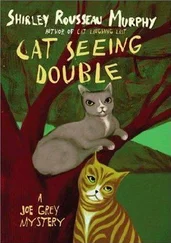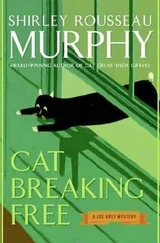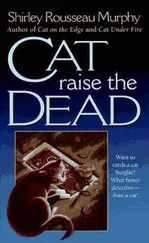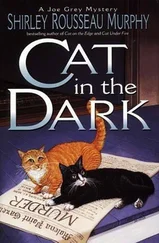Shirley Murphy - Murphy_Shirley_Rousseau_Cat_Coming_Home_BookFi
Здесь есть возможность читать онлайн «Shirley Murphy - Murphy_Shirley_Rousseau_Cat_Coming_Home_BookFi» весь текст электронной книги совершенно бесплатно (целиком полную версию без сокращений). В некоторых случаях можно слушать аудио, скачать через торрент в формате fb2 и присутствует краткое содержание. Год выпуска: 2010, ISBN: 2010, Издательство: HarperCollins, Жанр: Старинная литература, на английском языке. Описание произведения, (предисловие) а так же отзывы посетителей доступны на портале библиотеки ЛибКат.
- Название:Murphy_Shirley_Rousseau_Cat_Coming_Home_BookFi
- Автор:
- Издательство:HarperCollins
- Жанр:
- Год:2010
- ISBN:978-0-06-201838-0
- Рейтинг книги:4 / 5. Голосов: 1
-
Избранное:Добавить в избранное
- Отзывы:
-
Ваша оценка:
- 80
- 1
- 2
- 3
- 4
- 5
Murphy_Shirley_Rousseau_Cat_Coming_Home_BookFi: краткое содержание, описание и аннотация
Предлагаем к чтению аннотацию, описание, краткое содержание или предисловие (зависит от того, что написал сам автор книги «Murphy_Shirley_Rousseau_Cat_Coming_Home_BookFi»). Если вы не нашли необходимую информацию о книге — напишите в комментариях, мы постараемся отыскать её.
Murphy_Shirley_Rousseau_Cat_Coming_Home_BookFi — читать онлайн бесплатно полную книгу (весь текст) целиком
Ниже представлен текст книги, разбитый по страницам. Система сохранения места последней прочитанной страницы, позволяет с удобством читать онлайн бесплатно книгу «Murphy_Shirley_Rousseau_Cat_Coming_Home_BookFi», без необходимости каждый раз заново искать на чём Вы остановились. Поставьте закладку, и сможете в любой момент перейти на страницу, на которой закончили чтение.
Интервал:
Закладка:
19

THIS INVASION WAS as carefully planned as the others, but this one took just the two of them before joining the others to break up a couple of downtown restaurants. This lone woman was elderly and wasn’t close with her neighbors, wouldn’t have neighbors checking on her. All the hours they’d watched the place, they’d seen no neighborly visiting back and forth. Only one car in her garage, jammed in among boxes and trash, and there was never a second car in the drive, never any visitors. That first rush was the best, when they forced their way inside—when they rang the bell and the dumb broad opened right up to them. That first rush of the attack, slamming the door open in her face hard enough to knock her down. They’d kicked her a couple of times to keep her quiet and then trampled over her into the house.
They cased these places carefully before they went in, always knew if the mark was alone, always a different neighborhood, one poor, the next one well-to-do, it didn’t matter, and always a different time of night or day. Not all the marks lived alone, but each was alone at the time they rang the bell. They’d watched this house all afternoon, watched her pull her car out of the garage, one of them pretending to jog the neighborhood while the other parked out of sight. If they were doing this for the money gained by what they walked away with, it would be a washout, they’d be earning pennies an hour. But they were paid in other ways.
When she left, they’d followed her, driving real slow like she did. Big outing for the old girl, seven blocks to the local grocery. Followed her inside, walked the aisles as she did, making sure she wasn’t buying more than usual, wasn’t in fact expecting guests.
But she’d been shopping for only one: a quarter pound of hamburger, a small head of lettuce, one tomato. Pitiful, a lone woman, timid and careful in her ways—and stupid enough to open the door in the near dark, to a stranger. You had to laugh, people so trusting they’d let anyone in. Didn’t they read the papers? What did they think would happen, what did they expect? Standing over the cowering woman, they’d laughed at her and eased the door closed behind them, shutting out any view from the street. Though it didn’t matter much, the entrance really couldn’t be seen, the way the house was positioned and the door sheltered by those trellises hung heavy with some flowering vine, thick, dark leaves sprawling up the walls—another example of how foolish people were, inviting anyone to stand hidden in the shadows.
The woman was scared silly even before they gagged her, too scared to do more than croak out a whisper. She lay huddled on the wrinkled-up rug, her hands over her bleeding face, terrified they’d kick her again, begging them not to hurt her anymore. They liked that, they were in control. They took turns, one trashing the house, breaking dishes and furniture and little figurines, while the other fondled and teased her until she was white and shaking, terrified they’d rape her.
Of course they never did, Arlie didn’t want that complication. Didn’t want any shooting or rape, with the DNA evidence. Didn’t want the heavier sentence in case something went wrong—not that it would, not with him running things, Arlie was a master of deception.
They never bothered to steal much, only enough to make it look like a burglary. These diversions had nothing to do with selling stolen goods, that wasn’t the intent. Arlie paid his people well enough, and he was, as he put it, in it himself for another kind of payback.
More likely, if he told the truth—which Arlie was never famous for—he was in it for what others paid him, which might be considerable. He’d never talk about that, he’d just say, “For the payback,” and smile in that way that made a person’s spine crawl and leave it to your own imagination: the scenario wasn’t hard to figure out, though he’d never admit to doing this stuff for hire.
When they’d left this mark there in her trashed house, the way they’d gagged and tied her, it would take her a long time to call for help, would be hours before she could manage to reach the phone. And then when she did, she’d find it dead, the line to the wall cut and useless. There was an extension in the bedroom, but it would take her a while to make it up the stairs and get it plugged back in. That was fine, they didn’t want her not to call. The whole point was for her frantic call to the cops to be too late, the damage already done, her attackers long gone, the ensuing publicity enough to keep the village on edge until the next invasion.
After they tied her up, they’d touched base with Arlie there on the street and then headed into the center of the village, taking their time, at last joining the others to trash the two restaurants. What a ball, broken glass, broken furniture everywhere. By the time the cops swarmed in they’d been well away from the shattered windows and trashed interiors; they’d watched from some distance, hidden among the shadows as the black-and-whites came scorching in, their sirens screaming, red lights spinning—only then, still laughing, had they gotten the hell out of there. And the cops had no notion that elsewhere in the village, another invasion had come down. That call shouldn’t come in for hours, maybe not until morning.
20

EVEN AFTER THE two darkly dressed figures had left, Nannette Garver couldn’t cry out for help. The gag in her injured mouth was so tight it sent pain through her whole face and throat. She felt as if she were suffocating. Her jaw hurt so bad where they’d kicked her, she thought it might be broken. She lay on the living room floor, her legs bent double and bound up to her waist with heavy rope, her hands tied behind her. One big upholstered chair was overturned, her two small side chairs broken almost to kindling. Books had been pulled from the shelves, pages torn out in handfuls. The little porcelain figurines that she so loved, the little rabbits and running children, all were broken into jagged shards.
She didn’t think she could stand the pain of the gag much longer. But of course she had no choice. The phone lay across the room, where they’d knocked it off the little writing desk. When she tried to roll to it, she was jerked back—was tethered, like a tied-up dog, to the leg of the heavy armoire. She tried gingerly to pull it along with her, afraid it would fall on top of her. But it was too heavy to move at all, with the big old TV inside. She wondered if, with the receiver off the phone, that would alert 911.
But she knew better. She’d taken the receiver off many times when she didn’t want to be bothered with phone calls from salesmen or annoying pollsters. If you took the headset off, the canned voice would come on for a while, then the beeping would start, would go on and on until eventually blessed silence fell. Now she didn’t bless the promise of silence, but prayed someone was at the other end, someone to help her.
She thought if she could get free of the heavy armoire, even with her legs bent double and her hands tied behind her, she could roll or squirm across the room to the phone, thought that even with her hands tied and useless, she could depress the buttons on the fallen phone somehow, maybe with her chin. She couldn’t just give up, she had to do something.
The minute the robbers were out of the house, as soon as she’d heard a car pull away, she’d begun to fight the rope that tied her hands, wriggling and pulling, bending her fingers trying to get a grip on the knots. The harsh hemp fibers tore at her skin, she could feel the blood start. She hated the increasing frailty of her body as she grew older.
Читать дальшеИнтервал:
Закладка:
Похожие книги на «Murphy_Shirley_Rousseau_Cat_Coming_Home_BookFi»
Представляем Вашему вниманию похожие книги на «Murphy_Shirley_Rousseau_Cat_Coming_Home_BookFi» списком для выбора. Мы отобрали схожую по названию и смыслу литературу в надежде предоставить читателям больше вариантов отыскать новые, интересные, ещё непрочитанные произведения.
Обсуждение, отзывы о книге «Murphy_Shirley_Rousseau_Cat_Coming_Home_BookFi» и просто собственные мнения читателей. Оставьте ваши комментарии, напишите, что Вы думаете о произведении, его смысле или главных героях. Укажите что конкретно понравилось, а что нет, и почему Вы так считаете.












